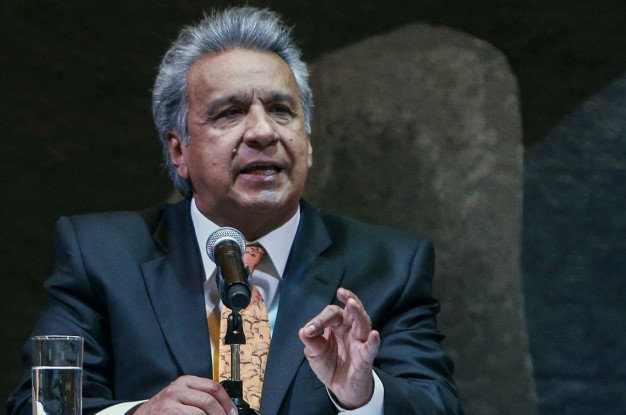Last week, nearing the completion of his second year as Ecuador’s president, Lenín Moreno used the announcement of a $4.2 billion IMF deal (in addition to a $6 billion package from multilateral lenders, including the World Bank) to proudly emphasize what he considered the greatest achievement of his presidency to date: “Thanks to the firm decisions I have made, we are not what Venezuela is today … We have recovered democracy,” Moreno said in a televised address.
Even critical observers are unlikely to contest his assertion. Moreno will rightly be remembered – and lauded – for having reverted the authoritarian turn led by Rafael Correa, his predecessor. Despite important progress in reducing poverty and stabilizing politics after years of turbulence, Correa ultimately overreached and ended up undermining Ecuador’s democracy.
A key moment of Moreno’s presidency thus far occurred exactly a year ago, when Ecuadoreans voted to reinstate a law that limits presidents to two terms, after Correa had abolished presidential term limits in 2015. Their decision made a Venezuelan, Nicaraguan or Bolivian scenario less likely. Under Moreno, pressure on NGOs, newspapers and academic institutions has diminished; he has also discontinued Correa’s habit of meddling in the judiciary.
In the same way, Moreno’s fight against corruption – symbolized by a long prison sentence for his former vice president (and Correa ally) Jorge Glas for “illicit association with Odebrecht” – is largely seen positively by Ecuadoreans. Abroad, Moreno is often named as an example of how to heal the scars in a country after the polarization that usually accompanies populist governments.
And yet, during a recent visit to Ecuador, very few of the people I spoke to expressed their whole-hearted support for Moreno. While his moderation and concrete steps to strengthen institutions earned him recognition in his first year as president – in late 2017, his approval ratings reached almost 80 percent – recent polls suggest little more than 30 percent of Ecuadoreans now support him.
The reasons for this seem to be threefold. First of all, many Ecuadoreans I spoke to suggested Moreno could have done more to reaffirm the sanctity of checks and balances. The process to reform the communications law – a notorious instrument that allowed Correa to arbitrarily impose fines against the media if they failed to publish articles he thinks they should have – is still ongoing. Despite the president’s frequent comments about fighting corruption, some believe that his efforts need to go beyond purging Correa bigwigs.
Several people I spoke to, some of whom know the president personally, also lamented that Moreno was aloof and disinterested in the minutiae of policymaking. “I think he may be a nice guy, but he has no vision,” a student of political science at Quito’s Universidad Andina Simón Bolívar told me, saying that “the best thing about Moreno is that he is not Correa.” That’s hardly enough for Moreno to sustain public support, despite initial excitement over his presidency.
Secondly, and perhaps more importantly, Moreno’s falling approval ratings may be due to an increasingly challenging economic context.
Ecuador is expected to grow by a meager 0.6 percent in 2019 after expanding 1.1 percent in 2018. The country continues to pay the price for Correa’s failure to save more during the oil bonanza. Public debt remains too high, partly due to more than $6 billion in loans taken from Chinese financial institutions to finance infrastructure projects, which Correa agreed to pay for by committing future oil exports to China. Ecuador has one of South America’s worst fiscal deficits, but austerity measures often destabilize governments in Ecuador, forcing Moreno to take only small steps.
Moreno’s televised announcement was not easy: Just like his Argentine counterpart, Mauricio Macri, who made the case for an IMF deal last year, Moreno tried to project optimism, fully aware that many Ecuadoreans view both the IMF and his austerity measures with deep skepticism. It is no coincidence that many on the left criticize Moreno for being a “macrista” at heart, and Correa has accused his successor of being a “a wolf in sheep’s clothing” and a “traitor.”
All that points to the political cost of moving to the center after a period of polarization. While “correistas” who revere the former president for his pro-poor policies contend that Moreno is stabbing his predecessor in the back, many in the upper and middle class think the president is not going far enough in undoing Correa’s legacy.
Finally, on several social issues – such as violence against women, a topic that has recently shaken the country and led to protests across Ecuador – Moreno has seemed to be off-message. When Diana Ramirez, a 26-year old pregnant woman, was killed by her boyfriend, Moreno decided to focus on the assassin’s Venezuelan nationality – a decision that enraged women’s rights activists, since the president seemed to shift the debate away from the plight of Ecuadorean women to one about immigration.
Moreno will be remembered as a leader who helped strengthen democracy after Correa. Yet, given his overall lackluster performance, the many challenges ahead and the fact he’s not expected to seek re-election in 2021, it seems unlikely he’ll regain the sky-high approval ratings that made him, little more than a year ago, one of Latin America’s most popular presidents.









